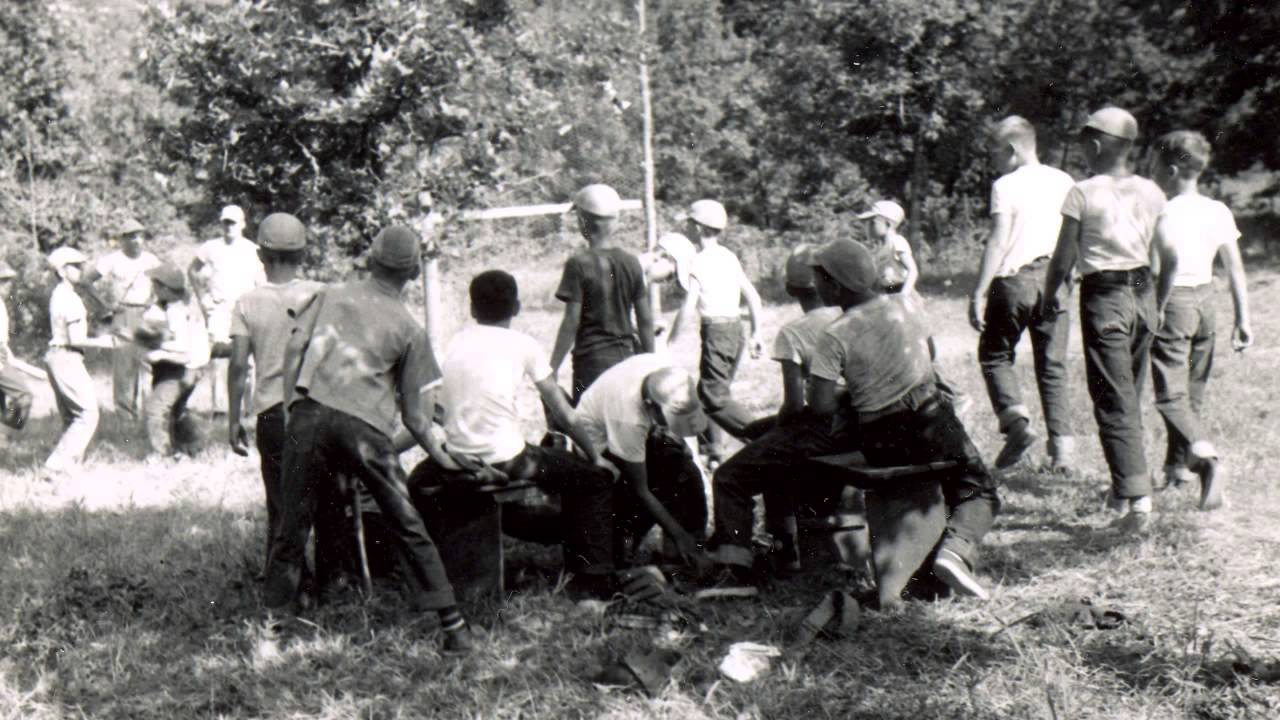249-The Robbers Cave Experiment
Futility Closet
Greg Ross
4.8 • 748 Ratings
🗓️ 20 May 2019
⏱️ 31 minutes
🧾️ Download transcript
Summary

In 1954 a social psychologist started a war between two teams of fifth graders at an Oklahoma summer camp. He wanted to investigate the sources of human conflict and how people might overcome them. In this week's episode of the Futility Closet podcast we'll review the Robbers Cave Experiment and examine its evolving reputation.
We'll also dredge up a Dalek and puzzle over a hazardous job.
Intro:
Butler University mathematician Jerry Farrell can control coin flips.
Nashville attorney Edwin H. Tenney gave a baffling Independence Day speech in 1858.
Sources for our feature on the Robbers Cave experiment:
Muzafer Sherif et al., Intergroup Conflict and Cooperation: The Robbers Cave Experiment, 1961.
Gina Perry, The Lost Boys: Inside Muzafer Sherif's Robbers Cave Experiment, 2018.
Ayfer Dost-Gozkan and Doga Sonmez Keith, Norms, Groups, Conflict, and Social Change: Rediscovering Muzafer Sherif's Psychology, 2015.
Paul Bloom, Just Babies: The Origins of Good and Evil, 2013.
Gina Perry, "The View From the Boys," Psychologist 27:11 (November 2014), 834-836.
Ralph H. Turner, "Some Contributions of Muzafer Sherif to Sociology," Social Psychology Quarterly 53:4 (December 1990), 283-291.
Muzafer Sherif, "Superordinate Goals in the Reduction of Intergroup Conflict," American Journal of Sociology 63:4 (January 1958), 349-356.
Gregory M. Walton and Carol S. Dweck, "Solving Social Problems Like a Psychologist," Perspectives on Psychological Science 4:1 (January 2009), 101-102.
O.J. Harvey, "Muzafer Sherif (1906–1988)," American Psychologist 44:10, October 1989, 1325-1326.
Elton B. McNeil, "Discussions and Reviews: Waging Experimental War: A Review," Journal of Conflict Resolution 6:1 (March 1962), 77.
Alex Haslam, "War and Peace and Summer Camp," Nature 556:7701 (April 19, 2018), 306-307.
Steven N. Durlauf, "A Framework for the Study of Individual Behavior and Social Interactions," Sociological Methodology 31 (2001), 47.
Gary Alan Fine, "Review: Forgotten Classic: The Robbers Cave Experiment," Sociological Forum 19:4 (December 2004), 663-666.
Andrew Tyerman and Christopher Spencer, "A Critical Test of the Sherifs' Robber's Cave Experiments: Intergroup Competition and Cooperation Between Groups of Well-Acquainted Individuals," Small Group Research 14:4 (November 1983), 515-531.
Samuel L. Gaertner et al., "Reducing Intergroup Conflict: From Superordinate Goals to Decategorization, Recategorization, and Mutual Differentiation," Group Dynamics: Theory, Research, and Practice 4:1 (March 2000), 98-114.
Furkan Amil Gur, Benjamin D. McLarty, and Jeff Muldoon, "The Sherifs' Contributions to Management Research," Journal of Management History 23:2 (2017), 191-216.
Anna E. Kosloski, Bridget K. Welch, "Confronting Student Prejudice With 'Mario Kart' Nintendo Wii," Social Thought and Research 31 (2010), 79-87.
Carol Tavris, "Thinking Critically About Psychology's Classic Studies," Skeptic 19:4 (2014), 38-43, 64.
Michael J. Lovaglia, "From Summer Camps to Glass Ceilings: The Power of Experiments," Contexts 2:4 (Fall 2003), 42-49.
J. McKenzie Alexander, "Group Dynamics in the State of Nature," Erkenntnis 55:2 (September 2001), 169-182.
Maria Konnikova, "Revisiting Robbers Cave: The Easy Spontaneity of Intergroup Conflict," Scientific American, Sept. 5, 2012.
Peter Gray, "A New Look at the Classic Robbers Cave Experiment," Psychology Today, Dec. 9, 2009.
David P. Barash, "Why People Kill," Chronicle of Higher Education, Nov. 8, 2015.
Barbara McMahon, "I Survived the Real-Life Lord of the Flies," Times, April 25, 2018, 2.
Leyla Sanai, "'The Lost Boys: Inside Muzafer Sherif's Robbers Cave Experiment', by Gina Perry - Review," Spectator, April 28, 2018.
Anoosh Chakelian, "The Lasting Wounds of Robbers Cave," New Statesman 147:5425 (June 29-July 5, 2018), 16-17.
Judy Golding Carver, "What Lord of the Flies Is Really About," Guardian, April 20, 2018, 8.
Eleanor Learmonth and Jenny Tabakoff, "'What Are We? Humans? Or Animals? Or Savages?'" Independent on Sunday, March 16, 2014, 26.
Darragh McManus, "The Real-Life 'Lord of the Flies,'" Irish Independent, May 5, 2018, 18.
David Shariatmadari, "A Real-Life Lord of the Flies: The Troubling Legacy of the Robbers Cave Experiment," Guardian, April 16, 2018.
Gina Perry, "Real-Life Lord of the Flies," Qatar Tribune, Feb. 24, 2018.
Peter Waterson, "Letters: Love-Hate," Guardian, Oct. 18, 2001, 25.
Listener mail:
Wikipedia, "Mojibake" (accessed May 10, 2019).
Victoria Ward, "'Weekend Foggy Earphones': How Three Random Words Helped Police Come to Rescue of Mother and Daughter," Telegraph, March 25, 2019.
Tiffany Lo, "How Mum and Daughter Were Saved by Saying Words 'Weekend Foggy Earphones' to Cops," Mirror, March 26, 2019.
Jane Wakefield, "Three-Unique-Words 'Map' Used to Rescue Mother and Child," BBC News, March 26, 2019.
Mark Bridge, "Valerie Hawkett: Three Words Find Woman Who Crashed Car in a Field," Times, March 26, 2019.
"Dr Who Dalek Found in Pond," Telegraph, March 4, 2009.
Wikipedia, "Dalek" (accessed May 10, 2019).
This week's lateral thinking puzzle was contributed by listener Sam Dyck, who, for background, sent this summary of 2017 fatal occupation injuries from the U.S. Bureau of Labor Statistics.
You can listen using the player above, download this episode directly, or subscribe on Google Podcasts, on Apple Podcasts, or via the RSS feed at https://futilitycloset.libsyn.com/rss.
Please consider becoming a patron of Futility Closet -- you can choose the amount you want to pledge, and we've set up some rewards to help thank you for your support. You can also make a one-time donation on the Support Us page of the Futility Closet website.
Many thanks to Doug Ross for the music in this episode.
If you have any questions or comments you can reach us at [email protected]. Thanks for listening!
Transcript
Click on a timestamp to play from that location
| 0:00.0 | Welcome to the Futility Closet Podcast, forgotten stories from the pages of history. |
| 0:14.7 | Visit us online to sample more than 10,000 quirky curiosities from a telekinesis display to an incomprehensible speech. |
| 0:22.8 | This is episode 249. I'm Greg Ross. And I'm Sharon Ross. In 1954, a social psychologist |
| 0:30.1 | started a war between two teams of fifth graders at an Oklahoma summer camp. He wanted to |
| 0:35.2 | investigate the sources of human conflict and how people might overcome |
| 0:39.0 | them. In today's show, we'll review the Robbers' Cave Experiment and examine its evolving |
| 0:44.6 | reputation. We'll also dredge up Adolic and puzzle over a hazardous job. In June 1954, a yellow school bus made its way east from Oklahoma City to Robbers' Cave |
| 1:01.2 | State Park in the foothills of the Sands Boys Mountains. It was carrying 12, 11-year-old boys. They |
| 1:07.4 | hadn't known each other when they'd left the city, but most of them had made friends by the time they reached the park. The park had got its name because it had served as a hiding |
| 1:14.9 | place for Jesse James, Bell Star, and other legendary outlaws. The boys would be staying there for |
| 1:19.9 | three weeks in their first experience of summer camp. The 12 had the park to themselves for a few |
| 1:25.0 | days, and they spent their time exploring it, hiking, canoeing, and swimming. After seeing two snakes at the creek, they named themselves the park to themselves for a few days, and they spent their time exploring it, hiking, |
| 1:32.1 | canoeing, and swimming. After seeing two snakes at the creek, they named themselves the rattlers. |
| 1:37.2 | They didn't know that another school bus had arrived shortly after theirs, at the other end of the park. |
| 1:40.8 | It was carrying a second group of boys who would call themselves the Eagles. |
| 1:44.8 | The boys had been told this was an ordinary summer camp, but in fact it it was an experiment being run by a social psychologist named Muzafar Sharif. Sharif and his team of |
| 1:50.1 | researchers would pose as camp staff members while they oversaw a week-long contest of games and |
| 1:54.9 | feats of skill between the two groups. The winning team would get a prize. Sharif had predicted |
| 2:00.0 | that this rivalry would breed hostility |
| 2:02.0 | between the two groups. Sherif's theory was that prejudice and conflict arise between groups |
| 2:07.4 | because they're competing for limited resources. But he hoped to show that this was reversible. |
| 2:11.9 | If the groups had to cooperate to find a solution to a shared problem, then their differences |
... |
Please login to see the full transcript.
Disclaimer: The podcast and artwork embedded on this page are from Greg Ross, and are the property of its owner and not affiliated with or endorsed by Tapesearch.
Generated transcripts are the property of Greg Ross and are distributed freely under the Fair Use doctrine. Transcripts generated by Tapesearch are not guaranteed to be accurate.
Copyright © Tapesearch 2025.

